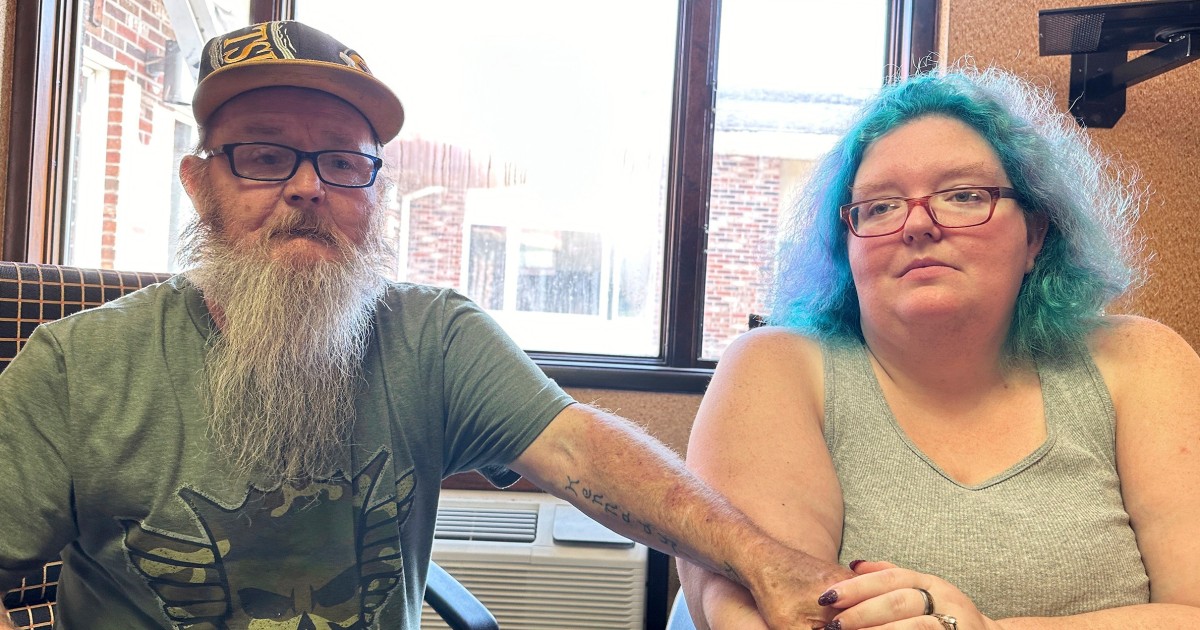Welcome to the online version of From the Politics Desk, an evening newsletter that brings you the NBC News Politics team’s latest reporting and analysis from the campaign trail, the White House and Capitol Hill.
In today’s edition, reporter Curtis Bunn brings us a dispatch from Kamala Harris' interview with members of the National Association of Black Journalists. Plus, national political reporter Ben Kamisar breaks down where third-party candidates are appearing on the ballot in key battlegrounds.
Sign up to receive this newsletter in your inbox every weekday here.
NABJ journalists press Harris for policy details on Gaza and reparations
By Curtis Bunn
PHILADELPHIA — Vice President Kamala Harris took questions from a panel of members of the National Association of Black Journalists on Tuesday — with some moments turning tense as she outlined her vision for her administration if she wins the November election.
Over 45 minutes, Harris spoke about a number of policies, including her economic plan, which includes spurring new housing construction through tax credits and offering financial assistance for first-time homebuyers and expanding the child tax credit.
Reporters Tonya Mosley of NPR, Gerren Keith Gaynor of TheGrio and Eugene Daniels of Politico repeatedly pressed Harris for direct answers on other topics, interrupting her multiple times when she veered away from the subject or rambled. She dodged a potentially contentious moment when Mosley stopped her during an answer about gun control.
The audience of about 150, including 100 college students, began to signal discomfort when Harris avoided answering a question about whether she would issue an executive order to create a commission to study reparations. Ultimately, she said it would come down to Congress, an answer that seemed to deflate some of the attendees.
Some members of the audience also signaled displeasure when she gave an indirect answer about whether she would continue the Biden administration’s approach to the Israel-Hamas war.
“I absolutely believe that this war has to end, and it has to end as soon as possible, and the way that will be achieved is by getting a hostage deal and the cease-fire deal done, and we are working around the clock to achieve that end,” Harris said.
Harris appeared six weeks after former President Donald Trump questioned her ethnicity and clashed with a journalist at the organization’s national convention in Chicago.
Focus returns to Springfield: Harris also ripped Trump’s repeated bashing of Haitian immigrants in Springfield, Ohio, in the NABJ interview, saying he was “spewing lies grounded in tropes.”
“It’s a crying shame. Literally,” Harris said in her most extensive remarks to date about Trump’s baseless claims.
The city has been hit with dozens of bomb threats, some at elementary schools, after Trump and his running mate, Sen. JD Vance of Ohio, promoted false rumors that immigrants were eating residents’ pet dogs and cats.
“I mean, my heart breaks for this community. You know there were children, elementary school children,” who had to be evacuated on what was supposed to be school picture day, Harris said.
Separately, Springfield Mayor Rob Rue said at a news conference that a visit from Trump “would be an extreme strain on our resources.”
“So it’d be fine with me if they decided not to make that visit,” he said.
Where third-party candidates have gotten on — or off — the ballot in key swing states
By Ben Kamisar and Jiachuan Wu
Third-party candidates have played a big role in deciding key presidential battleground states in the last few years — meaning which (and how many) candidates will actually be on ballots state by state could matter a lot in a close election between Kamala Harris and Donald Trump.
That reality has led to a series of protracted court battles over ballot access across the country. In recent weeks, state Supreme Courts in North Carolina and Michigan issued different decisions, allowing former independent presidential candidate Robert F. Kennedy Jr. to remove himself from the ballot in the first but keeping him on the ballot in the second. After having spent millions to get on state ballots, Kennedy has tried to pull back since he endorsed Trump.
Kennedy, the descendent of one of the party’s most storied families, initially sparked fears among Democrats that he could jeopardize their path to the White House. But Kennedy’s base of support grew more right-leaning this year, eventually pulling more from people who might back Trump. And there are still other third-party candidates, including some familiar faces and some new ones, whose presence on key state ballots could affect the November results.
Michigan and Wisconsin are set to have the most crowded presidential ballots, while there will be just a couple of well-known third-party options on the ballots in Arizona and Pennsylvania (where certification is still pending as of mid-September) and just one in Nevada.
Along with Michigan, Wisconsin is the other swing state where Kennedy hasn’t been able to remove himself from the ballot — though he is asking a court to allow him to do so.
Democrats don’t have to look far into the past to find an election in which a robust third-party vote contributed to their defeat. In 2016, 6% of all voters cast votes for third-party candidates, a dynamic that helped lower the share of the vote Trump needed to win in key battleground states. In 2020, when the third-party share dropped to 2%, Joe Biden defeated Trump.
🗞️ Today’s top stories
- 👀 Eyewitness account: Businessman Steve Witkoff, a longtime friend of Trump’s who was on the golf course with him Sunday, described the dramatic moment he heard gunshots and saw Secret Service agents dive on top of Trump during the apparent assassination attempt. Read more →
- 💲 Emergency funding: Congress is considering boosting funding for the Secret Service after the apparent attempt on Trump’s life. Read more →
- 🟢 Another go: Speaker Mike Johnson said the House will vote Wednesday on a six-month stopgap funding bill linked to legislation that would require proof of citizenship to register to vote — the same package he abruptly pulled off the floor last week amid growing GOP opposition. Read more →
- 🚫 No-go: Senate Republicans blocked another vote on protections for in vitro fertilization, who called it unnecessary and politically motivated as Democrats seek to make it a campaign issue. Read more →
- 📺 On air: A conservative group is launching a Spanish-language ad in critical battleground states that strikes two drastically different tones — first touting voting as patriotic but then warning that it is illegal for noncitizens to cast ballots in federal elections. Read more →
- 🗳️ Ballot battles: A top election official in Arizona said he would file a suit that could bar nearly 100,000 residents from voting in state and local races this fall, claiming they haven’t provided citizenship documents required under state law. Read more →
- 🎤 Getting the band together: Billie Eilish and her brother, Finneas, became the latest musicians to throw their support behind Harris for president. Read more →
- Follow live coverage from the campaign trail →
.png)
 1 day ago
1
1 day ago
1









 English (US) ·
English (US) ·